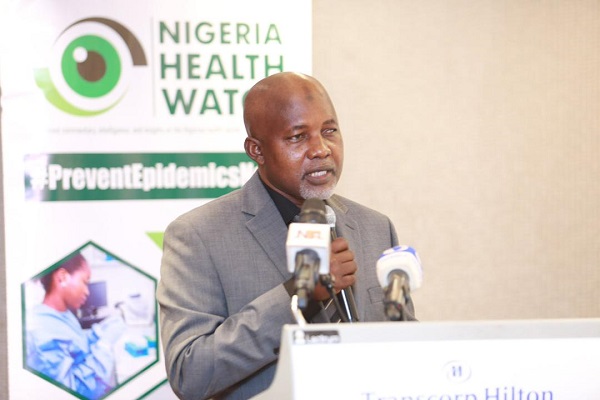
A former chairman of the House of Representatives Committee on Health, Hon. Tanko Sununu has emphasised the critical need for a comprehensive and holistic approach to address the multi-sectoral nature of nutrition.
Sununu’s remarks came during the annual result conference of the Accelerating Nutrition Results in Nigeria (ANRiN) project held in Abuja.
The conference, themed “Innovative Approaches to Strengthening Systems for a Sustainable Whole Government Response,” aimed to share insights and experiences from the implementation of ANRiN. This transformative project, supported by $232 million in funding from the International Development Association (IDA), the World Bank Funds and the Global Financing Facility for Women, Children and Adolescents (GFF), is focused on enhancing the utilisation of quality and cost-effective nutrition services for pregnant women, adolescent girls and children under five in selected states across Nigeria.
Sununu, a medical doctor, pointed out that there is currently no committee specifically dedicated to nutrition in the National Assembly, highlighting the need to advocate for one to secure increased funding for nutrition-related initiatives. He stressed that stakeholder commitment is crucial to ensuring sustained funding and critical resources for effective nutrition interventions. He further called on governments at all levels to prioritise nutrition as a key governance and development issue, with the ultimate goal of reducing or eliminating malnutrition in the country.
The national programme manager of ANRiN, Dr. Ojuolape Solanke emphasised the role of non-state actors in delivering essential nutrition services at the community level. These services include counselling on exclusive breastfeeding and improving the nutritional status of children. Solanke highlighted the importance of adopting innovative approaches to address the country’s nutrition challenges and encouraged collaboration across sectors to improve nutrition outcomes.
To create awareness about bio-fortification and diverse nutritious meals, the director of nutrition at the Ministry of Agriculture and Rural Development, Mrs. Sugra Mahmood discussed the ministry’s partnership with the media. Mahmood also mentioned the ministry’s training initiatives on supplementary feedings to enhance nutritional support.
A senior health advisor at the Nigeria Governors Forum, Dr. Ahmed Abdulwahab emphasised the need to optimise existing funds rather than solely seeking additional resources. He emphasised the importance of effective allocation and utilisation of available funds. Abdulwahab argued that budget tagging alone would not provide sufficient transparency for tracking expenditure, but a deeper understanding of where the money goes would facilitate effective advocacy.
A public financial management consultant, Dr. Fola Adejumo highlighted the necessity for the Federal Government to effectively manage its finances to successfully implement interventions in the country. Adejumo underscored the need for a framework to allocate resources and balance expenditures and revenues. She revealed that many nutrition-related expenditures were not adequately accounted for, and budget tagging would enhance transparency and reporting, leading to more meaningful conversations with stakeholders.
Clear and accurate data was emphasised by Adejumo as crucial for effective public finance management. The first step, according to her, is ensuring well-described and captured data, enabling effective communication of ideas and guiding resource allocation.
The special advisor to the governor on budget in Gombe State, Dr. Ishiyaku Mohammed discussed the collaborative efforts of nutrition stakeholders in developing a 10-year development plan aligned with the Sustainable Development Goals (SDGs). Mohammed highlighted the use of context-specific messaging, which resonated with the public and facilitated behaviour change. Communication strategies, he emphasised, should remain relevant and tailored to the local context.
The head of nutrition and ANRiN focal person at the Ministry of Finance, Budget and National Planning, Mrs. Chito Nelson described the ANRiN project as the largest and most effective nutrition flagship program in Nigeria. Nelson highlighted the significant investment and substantial gains made through the project. She explained that although the ANRiN project is currently implemented in only 12 states, its impact extends to the entire country, improving nutrition governance and administration.
Nelson provided specific examples of the project’s achievements, including the development of the National Nutrition Dashboard and the provision of nutrition, water, sanitation and menstrual hygiene education to 142 schools. Additionally, the project delivered nutrition education to 6,000 women and adolescents and provided nutrition-smart income-generating activities equipment to 1,200 women.
The conference highlighted the importance of adopting a holistic and multi-sectoral approach to nutrition. It called for increased funding, stakeholder commitment, and prioritisation of nutrition as a key governance and development issue. By working together across sectors, leveraging innovative approaches, and ensuring effective financial management, Nigeria can address its nutrition challenges and improve the well-being of its population.
The ANRiN project serves as a testament to the positive impact that can be achieved through collaborative efforts and targeted interventions. Moving forward, it is crucial to sustain the momentum and continue investing in nutrition to create a healthier and more prosperous Nigeria for all.

